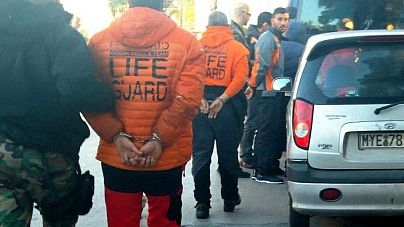He set out to rescue people fleeing conflict over the Mediterranean to Greece. But in less than two months' time he could be sentenced for people-smuggling by a Greek court.
Five humanitarian workers stand accused of attempting to smuggle people from Turkey to Greece during the height of the migrant crisis. Salam Aldeen is one of them nervously awaiting his trial date. He, like the others — a Dane and three Spanish firefighters — insists he only saved people from drowning and never ventured into Turkish waters.
 ADVERTISEMENT
ADVERTISEMENT
 ADVERTISEMENT
ADVERTISEMENT
Aldeen’s story starts in September 2015. He was watching the news at his home in Denmark, when he saw the images of Syrian toddler Alan Kurdi washed up on a Turkish beach. The pictures sent shockwaves around the world.
Horrified by what he saw, he set out to Greece and two days later found himself on the island of Lesbos pulling boats full of people to land. At night he would drive the new arrivals to refugee camps.
Initially, he had planned to stay only a week. Speaking to Euronews from his home late one evening, Aldeen recalls, “What I did that week changed my life.” Soon after departing Greece he returned with people he knew in Denmark were also eager to help the thousands of people, many of them fleeing conflict in Syria and Iraq.
For the next four months, day after day, he helped bring boats filled with migrants to land. Both he and his organisation, Team Humanity, shared numerous videos and photos of the rescue efforts on Facebook. The scenes are familiar, rubber boat after rubber boat landing on shore filled to the brim with people. Many of them came from Syria and Iraq, fleeing deadly conflicts. Often migrants’ passage from Turkey was precarious, and Aldeen estimates he helped bring at least 15,000 people to dry land.
On January 13, 2016, his team received a distress call in the late morning and headed out to sea. According to Aldeen, the boat was sinking fast and he contacted the coast guard for permission to save those onboard. At first reluctant to give permission, he says, his team were eventually allowed to pull the boat to shore. However, soon they were confronted by angry officials at the port authority. Eventually, he was allowed to go home.
Later that night, Aldeen saw another distress call on a Whatsapp group sharing information among volunteers. Together with the Spanish firemen they set out to find the boat. Here, Aldeen insists port authorities had given the green light to them going out and told them to make contact again once the capsizing boat was located. At sea in pitch black and searching for the boat, Aldeen says they were intercepted by a coast guard vessels and ordered back to land.
There they were detained and questioned. Next, he says, they were asked to sign a document in Greek, which he didn’t understand. He refused. Later, his lawyer told him the paper contained a confession for human trafficking. “I was in shock because they accused me of being in Turkey and having refugees in the boat,” Aldeen said.
As part of his bail conditions Aldeen was not able to leave Greece after his release — on account of his team’s boat being registered in his name, he believes. With his boat confiscated he continued doing as much as he could on shore and in camps up and down the country. Regularly taking to Facebook, he chronicled his work with migrant children, finding homes for migrants living on streets and organising aid.
In September last year, he finally received the news that he was able to leave the country. This, too, he shared on Facebook, with a photo of him triumphantly standing on a rock in the sunshine with a backdrop of sky and sea, holding the necessary paperwork.
In early May, Aldeen will return to face the judge, possibly facing many years in jail. Despite his ordeal, he continued his charity work even after leaving Greece with Facebook Live videos showing him back on Lesbos in February at the infamous Moria camp, an overcrowded reception centre for migrants, many of whom have been living there for years in very poor conditions.
Of his charity work, Aldeen says, “It’s like an addiction. You never forget the faces of the people who you rescue in the sea.”











